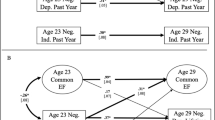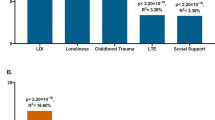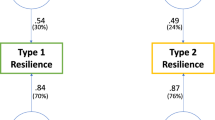Abstract
The way people cope with stressors of day to day living has an important influence on health. The aim of the present study was to explore whether genetic and environmental variations in stress-coping differ over time during adulthood. The brief COPE was mailed to a large sample of the UK female twins (N = 4,736) having a wide range of age (20–87 years). Factor analyses of the items of the brief COPE yielded three coping scales: ‘Problem-Solving’, ‘Support Seeking’, and ‘Avoidance’. Monozygotic and dizygotic twin correlations tended to become lower with age for all three scales, suggesting that unique environmental factors may become more important with age during adulthood. Model-fitting results showed that relative influences of unique environmental factors increased from 60 % at age 20 years to 74% at age 87 years for ‘Problem-Solving’ and 56 % at age 20 years to 76% at age 87 years for ‘Avoidance’. During the same age period, genetic factors decreased from 40 to 26 % for ‘Problem-Solving’ and from 44 to 24 % for ‘Avoidance’. For ‘Seeking Support’, the magnitude of genetic and unique environmental factors was not significantly different across the adulthood. For all three scales, shared environmental effects were negligible. Overall, our findings implicate that the effects of environment that stem from idiosyncratic experience of stressful life events accumulate and become increasingly important in adulthood.



Similar content being viewed by others
References
Afari N, Karen B, Schmaling RH, Hartman S, Goldberg J, Buchwald DS (2000) Coping strategies in twins with chronic fatigue and chronic fatigue syndrome. J Psychosom Res 48:547–554
Akaike H (1987) Factor analysis and AIC. Psychometrica 52:317–332
Carver CS (1997) You want to measure coping but your protocol’s too long: consider the brief COPE. Int J Behav Med 4:92–100
Charles ST, Almeide DM (2007) Genetic and environmental effects on daily life stressors: more evidence for greater variation in later life. Psychol Aging 22:331–340
Eaves LJ (1988) Dominance alone is not enough. Behav Genet 18(1):27–33
Endler NS, Parker JDA (1990) Multidimensional assessment of coping: a critical evaluation. J Pers Soc Psychol 58(5):844–854
Folkman S, Lazarus RS, Pimley S, Novacek J (1987) Age differences in stress and coping processes. Psychol Aging 2:171–184
Fraga MF, Ballestar E, Paz MF, Ropero S, Setien F, Ballestar ML, Heine-Suner D, Cigudosa JC, Urioste M, Benitez J, Boix-Chornet M, Sanchez-Aguilera A, Ling C, Carlsson E, Poulsen P, Vaag A, Stephen Z, Spector TD, Wu Y-Z, Plass C, Esteller M (2005) Epigenetic differences arise during the lifetime of monozygotic twins. PNAS 102:10604–10609
Heszen-Niejodek I (1997) Coping style and its role in coping with stressful encounters. Eur Psychol 2:342–351
Jang KL, Thordarson DS, Stein MB, Cohan SL, Taylor S (2007) Coping styles and personality: a biometric analysis. Anxiety Stress Coping 20:17–24
Kato K, Pedersen NL (2005) Personality and coping: a study of twins reared apart and twins reared together. Behav Genet 35:147–158
Kendler KS, Kessler RC, Heath AC, Neale MC, Eaves LJ (1991) Coping: a genetic epidemiological investigation. Psychol Med 21:337–346
Kim-Cohen J, Caspi A, Taylor A, Williams B, Newcombe R, Craig IW, Moffitt TE (2006) MAOA, maltreatment, and gene–environment interaction predicting children’s mental health: new evidence and a meta-analysis. Mol Psychiatry 11(10):903–913
Kozak B, Strelau J, Miles JNV (2005) Genetic determinants of individual differences in coping styles. Anxiety Stress Coping 18:1–15
Lazarus RS (1993) Coping theory and research: past, present, and future. Psychosom Med 55(3):234–247
Lazarus RS, Delongis A (1983) Psychological stress and coping in aging. Am Psychol 38:245–254
Lieberman MA, Tobin SS (1983) The experience of old age: stress, coping, and survival. Basic Books, New York
Maes S, Leventhal H, Ridder TD (1996) Coping with chronic diseases. In: Zeidner M, Endler NS (eds) Handbook of coping: theory, research, applications. Wiley, New York
Murgatroyd C, Patchev AV, Wu Y, Micale V, Bockmühl Y, Fischer D, Holsboer F, Wotjak CT, Almeida OF, Spengler D (2009) Dynamic DNA methylation programs persistent adverse effects of early-life stress. Nat Neurosci 12:1559–1566
Neale M, Boker SM, Xie G, Maes H (2003). Mx: statistical modeling. Department of Psychiatry, VCU, Richmond
Nelson EA, Dannefer D (1992) Aged heterogeneity: fact or fiction? The fate of diversity in gerontological research. Gerontologist 32(1):17–23
Petronis A (2006) Epigenetics and twins: three variations on the theme. Trends Genet 22(7):347–350
Purcell S (2002) Variance components models for gene–environment interaction in twin analysis. Twin Research 5:554–571
Sawyer MG, Pfeiffer S, Spence SH (2009) Life events, coping and depressive symptoms among young adolescents. a one-year prospective study. J Affect Disord 117:48–54
Snieder H, Harshfield GA, Barbeau P, Pollock DM, Pollock JS, Treiber FA (2002) Dissecting the genetic architecture of the cardiovascular and renal stress response. Biol Psychol 61:73–95
Spector TD, Williams FM (2006) The UK adult Twin Registry (TwinsUK). Twin Res Hum Genetics 9:899–906
Vinberg M, Froekjaer VG, Kessing LV (2010) Coping styles in healthy individuals at risk of affective disorder. J Nerv Ment Dis. 198(39–44):2010
Watson D, Hubbard B (1996) Adaptational style and dispositional structure: coping in the context of the five-factor model. J Pers 64:737–774
Weaver IC, Cervoni N, Champagne FA, D’Alessio AC, Sharma S, Seckl JR, Dymov S, Szyf M, Meaney MJ (2006) Epigenetic programming by maternal behavior. Nat Neurosci 7:847–854
Acknowledgments
The first author (Y.M. Hur) is supported by the Pioneer Fund, USA and Korea Research Foundation Grants. TwinsUK register is supported by the Wellcome Trust. We would like to thank twins who participated in our study and Irina Gillham-Nasenya for the data management.
Author information
Authors and Affiliations
Corresponding author
Additional information
Edited by Deborah Finkel.
Rights and permissions
About this article
Cite this article
Hur, YM., MacGregor, A.J., Cherkas, L. et al. Age Differences in Genetic and Environmental Variations in Stress-Coping During Adulthood: A Study of Female Twins. Behav Genet 42, 541–548 (2012). https://doi.org/10.1007/s10519-012-9541-2
Received:
Accepted:
Published:
Issue Date:
DOI: https://doi.org/10.1007/s10519-012-9541-2




